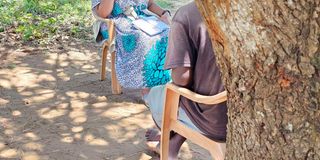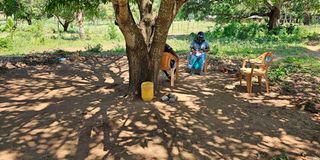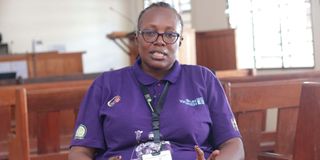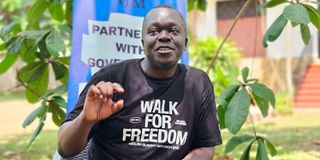A father's horror: How poverty and religious manipulation enabled years of child abuse in Kilifi

Chichi*, a 37-year-old man during the interview on Nov.12, 2024. His three daughters were subjected to sexual exploitation by an American man.
What you need to know:
- A poverty-stricken father of 10 in Kilifi County fell prey to an American "bishop" who, through religious manipulation and promises of a better life, gained access to his three daughters and sexually abused them.
- Kenya's coastal region grapples with sexual exploitation of minors, often enabled by poverty, with Kilifi and Kwale courts making strides through specialised procedures to help survivors seek justice.
- Despite his desperate circumstances and a Sh2.5 million bribe offer, the father chose justice over money, exemplifying how proper support systems and determination can help break the cycle of exploitation, even as his case continues through the justice system.
As I settle into a plastic seat beneath a sprawling mango tree, its limbs heavy with ripe fruit in the sweltering heat of Kilifi County, my gaze falls upon a barefoot man clad in an oversized, faded jungle green shirt and a washed-out black T-shirt.
He walks away from a rickety mud house that lacks a door, while three of his 10 children play in the damp soil, lost in the innocent joys of childhood.
Little do I know that I am about to experience a chilling flashback to "Disciples," a haunting documentary by BBC Africa Eye detailing the dark legacy of TB Joshua, a Nigerian televangelist who died in 2021 after a lifetime of raping and torturing women and girls enslaved within his cult-like following.
Before me sits Chichi*, a 37-year-old man who dropped out of Class Six due to extreme poverty. He found employment as a waiter in coastal hotels, working his way up to the position of cook. Eventually, he secured a job as a caretaker in residential flats, earning Sh44,000 a month.
Chichi, a father of 10, was well cared for; his employer took charge of everything — providing a home for his family, supplying food, and covering the school fees for his children, even purchasing their books and uniforms.
However, in early 2015, trouble arrived at his doorstep. The owner of the properties Chichi managed decided to sell. This opportunity attracted an American in his 60s. Chichi remembers the man describing himself as a “professor of Hebrew,” claiming to have translated the Bible into the King James Version. Subsequently, this man became an unwelcome, frequent visitor, accompanied by three Kenyan women who he referred to as his “wives” and “disciples.”
“He would spend over five hours at the property, teaching me his twisted interpretation of Biblical teachings,” Chichi recounts. “He probed me so thoroughly that I revealed everything about my life to him.”
He shared intimate details, including how, after the birth of their second child, he and his wife had attempted two methods of birth control, both of which failed, nearly costing his wife her life.

Chich* (leaning on the tree) a poverty-stricken father in Kilifi County, who worked his way up from waiter to property caretaker, lost everything after falling under the influence of an American "bishop" who manipulated him through religious teachings.
Terrified of losing her, they abandoned the idea. Though a doctor had advised him to undergo a vasectomy, the fear of becoming unwell, like his wife, kept him from proceeding. With such fears mutual, they lived a laissez-faire existence, having a child yearly or within two years.
“He was very pleased with my way of life,” Chichi notes. Furthermore, Chichi had an enduring love for reading the Bible, a passion cultivated from his upbringing in a Christian household. However, his Muslim employer forced him to convert, yet deep down, he remained a Christian, reading the Bible daily in his spare time — an obsession that delighted the American visitor.
Yet, the spectre of fear loomed over Chichi. Despite the man’s increasing visits, he had not indicated any intention of purchasing the property, even after being shown the necessary documents to validate ownership. The American abruptly ceased his visits in December, only to resurface two years later.
In early 2019, he knocked on Chichi’s gate, clearly alarmed to find that things had changed significantly under the new ownership, as an Arab had purchased the property and installed cameras everywhere. Seeing the cameras, the man warned Chichi he was living in a “lion’s den” and urged him to escape quickly before the “lions” devoured him.
“He told me it was time for me to live a free life, away from my employer, whom he likened to a lion,” Chichi remembers.
The man’s teachings discouraged enjoyment of earthly pleasures, such as earning a living, educating children, and seeking medical treatment. By this time, he had introduced two women to him and his wife, who acted as his “advisors.” Chichi began consulting them on every decision, including when complications arose during his wife’s childbirth.
“Torn between the teachings of this ‘bishop’ and the need to ensure my child’s safety, I reached out to him for guidance. He instructed me to remove my wife and suffering child from the hospital without allowing doctors to intervene,” he recalls.
“He even sent two of his so-called ‘wives’ to ensure I followed his orders. Terrified, I ultimately decided to save my child instead; I allowed the doctors to proceed with minor surgery, and thankfully, my child recovered.”
Under immense pressure to withdraw his children from school, Chichi eventually caved in, despite being summoned by the area chief and warned against such drastic actions. His employer disapproved as well, but Chichi had become thoroughly brainwashed; the only guidance he deemed valid stemmed from the 'bishop.'
The 'bishop' insisted on home-schooling, and as soon as Chichi withdrew his three daughters from school in 2019 — then aged 10, nine, and seven — he sent them directly to reside with him in another coastal town. Still unfulfilled, he pressured Chichi to quit his job, despite having an employment contract valid for another year and seven months.
Again, Chichi's employer cautioned him against following a foreign stranger, but the 'bishop' painted a vivid picture of a future free from struggle, filled only with joy and happiness.
Larger home
Things took a drastically different turn the day Chichi announced his resignation. The 'bishop' ordered his disciples to find him an unremarkable rental place for a mere Sh1,000 — a tiny, dingy abode scarcely fit for a family.
“He then employed me as a servant, tasked with cleaning his residence twice a week for a meagre Sh1,000,” he states, a pained expression crossing his face.
Out of that meagre wage, he would spend Sh400 on transport. Later, the American announced he had located a larger home, where they would all reside together.
“He provided us with one spacious villa with four bedrooms and another smaller two-bedroomed unit. The children stayed in the larger villa, while my wife and I occupied the smaller one,” he explains.
In 2021, another woman — one he had “newly married”—cautioned Chichi about the ‘bishop’s’ ulterior motives.
“She warned me that he intended to make my daughters his wives, but I failed to believe her. I placed my trust in him,” he says, a note of regret creeping into his voice.
At that time, Chichi was entirely dependent on the ‘bishop,’ who had reduced his wages to Sh500 daily. The worst was yet to come. One fateful midnight in February 2024, Chichi was violently awakened by an enraged ‘bishop’ brandishing a gun. He was furious over Chichi’s eldest daughter’s refusal to yield to his unwanted advances.
Chichi reveals that his daughter had finally reached her breaking point after enduring years of sexual abuse. She was prepared to face down the barrel of that gun, unwilling to tolerate the torment any longer.
“We reported the incident, and he was arrested, only to be released shortly thereafter. I eventually gave up on the case and contacted my cousin, who helped me build this house. We moved out,” he says, breaking down into racking sobs for almost five minutes.
During questioning, the younger daughters also disclosed that they had been subjected to repeated indecent acts while in the ‘bishop’s classroom,’ alongside other children. Among them were two girls belonging to his so-called ‘wives.’
While he was arrested, the children were put in a safe house. It is this rescue centre that rekindled Chichi’s hope for justice as they connected him with a global organisation dedicated to protecting those in poverty from human trafficking, modern-day slavery, violence, and police abuse of power.
Impoverished
The organisation had to engage law enforcement officers from Nairobi to apprehend the paedophile, and the case is currently ongoing.
Had it not been for the safe house and the involvement of a dedicated children's officer, this vile predator might have continued lurking in the shadows, preying on the next innocent girls whose rights to a safe and nurturing environment — free from violence and exploitation—are safeguarded under the Children Act of 2022.
The proactive involvement of the shelter in notifying the international organisation serves as proof of how effective coordination within justice systems can benefit the impoverished and vulnerable, who often lack the means to navigate their way out of dire situations, especially when beset by the corrupt practices of the affluent.
Kilifi and Kwale Law Courts have made strides in promoting access to justice for survivors of sexual and gender-based violence (SGBV), particularly those from impoverished backgrounds at risk of being silenced through monetary settlements, threats, or intimidation.
They stand as the only courts in Kenya where Court Users Committees (CUCs) have established SGBV Standard Operating Procedures (SOPs). These provide a clear framework for all actors within the criminal justice system on how to handle survivors of SGBV, ensuring that the survivor’s access to justice is preserved and that they are not re-traumatised.
CUCs are official forums created within the Judiciary to address challenges that affect the efficient and effective delivery of services at the court level. Their membership includes multiple statutory justice agencies and organisations working to eradicate SGBV while improving legal and support mechanisms.
These guidelines significantly encourage a culture of reporting SGBV at all levels, including those who might otherwise remain silent, such as the elderly in the village or local ride operators.
Moreover, the SOPs urge all actors to follow up on cases, striving to combat the powerful forces of wealth that often derail justice — namely, wealthy perpetrators and families bound by a culture of protecting their kin from shame and stigma.
Lillian Lewa, the Principal Magistrate of Kwale Law Courts, explains how the SOPs have propelled access to justice for the disadvantaged.

Lillian Lewa, Principal Magistrate at Kwale Law Courts, and head of station at the Kwale Law Courts, in this photo taken on November 14, 2024.
“We’ve seen cases brought forth through the CUCs, as the SOPs have enabled locals to understand what steps to take if they feel unjustly treated. Often, families of survivors are pressured by the perpetrator to withdraw the case, either through threats or offers of money in exchange for their release,” she explains.
“When we receive such cases, we ensure we follow up through proper channels to guarantee that survivors obtain justice. No girl should be denied justice because she comes from a poor family. No, no!”
Ivy Wasike, who serves on the Kilifi CUC as the Principal Magistrate at the Kilifi Law Courts, affirms that the SOPs have empowered various actors to draw serious sexual offence cases to the attention of the court—cases that might otherwise slip through the cracks.
“The SOPs inspire hope in tackling defilement in Kilifi. They bring collective attention to monitor, report, and track these cases through the justice system. We proactively reach out to the community to educate them on the importance of protecting their girls and the necessity of speaking out,” she states.
For the two days each week that she hears SGBV cases, no fewer than seven red (defilement) files land on her desk daily—a staggering total of 14 files representing the harrowing stories of girls and boys who have suffered the trauma of child sexual abuse.
“To listen to a child recount how they were violated is akin to enduring a horror film I never wish to relive. But I have no choice. My heart sinks to the deepest depths each time a defilement case is presented in court,” she confides.

Kilifi Principal Magistrate Ivy Wasike during an interview at the Kilifi Law Courts on November 13, 2024.She has handled many SGBV cases at the station.
In conjunction with other CUC members, including local leaders, religious figures, and prosecutors, Lillian and Ivy both express how deeply these cases affect them, often leaving them emotionally shattered. When the emotional toll becomes overwhelming, they allocate time away from their duties for counselling — services covered by their medical insurance.
“At the end of the day, I must deliver a judgement based on the evidence. I cannot allow trauma to cloud my ruling. However, SGBV cases are the most distressing, and we must come together to eradicate these crimes,” Lillian emphasises.
The magistrates have witnessed poverty's devastating impact on coastal youth. In one case, a young man pleaded for acquittal, claiming his in-laws had framed him. The magistrate revealed that the poor in-laws, backed by his own parents, had forced him at age 17 to marry their 13-year-old daughter despite his meagre earnings as a casual labourer.
"He could barely feed himself, yet they kept demanding dowry. When they saw he had nothing left to give, they fabricated defilement charges against him," she recounts. "The girl has confirmed his story and doesn't want him jailed. She sees him as her husband."
Unlike rape cases — where adult survivors may dictate the course of legal action under the Kenyan Constitution — defilement cases involve minors, placing them under the protection of the state. Children lack the agency to make independent decisions, hence the judiciary is obligated to shield them, without tolerating any attempts to withdraw or interfere with the case proceedings.
The SOPs envision a future where families, often driven by the desire to conceal defilement and rape cases to protect their reputations, will instead prioritise the rights of victims and report these crimes.
"Amina's* case exemplifies how breaking the silence is possible, even in the face of cultural pressure and shame. At the tender age of 14, she was repeatedly defiled by a distant uncle in urban Kilifi County. He not only impregnated her but coerced her into an abortion — a traumatic ordeal that would haunt her for months before she found the courage to speak.

Amina* at her home in Kilifi County on November 12, 2024. She had always been a bubbly and sociable girl until a horrific incident in 2019, turned her world upside down and left her a mere shadow of her former self—an anxious, withdrawn 14-year-old.
When Amina finally revealed her trauma to her mother in 2020, she was met with fear rather than support. "Please don't let anyone know about this," her mother pleaded, terrified of community stigma. "I thought prayer alone would heal us both."
But Amina's maternal uncle refused to let the crime go unpunished. Unlike many family members who choose silence to protect reputations, he saw only a child who needed justice. While her mother grappled with the painful reality, the uncle took decisive action. He gently took Amina's hand and led her to the police station.
"Don't be scared," he reassured her repeatedly. "That criminal must face justice. What he did was wrong, and you are not to blame. He alone is the criminal who deserves punishment." For Amina, his unwavering support became a lifeline. "His words made me feel protected and loved," she says quietly.
The perpetrator was arrested, and the case continues through the justice system.
Back to Chichi's case, his experience reveals the darker side of seeking justice. Questions linger about how the American was released and why the case initially went cold..."
A police officer, whose name we cannot disclose to protect him from potential disciplinary action since he is not authorised to speak with the media, revealed that there are corrupt officers within the force.
“I cannot deny that there are rogue individuals who will accept bribes to dismiss cases. But surely, how can one be bribed to free a sexual offender who could turn around and rape your mother?” he questions.
"Seeking justice for sexually abused children involves navigating complex legal requirements and challenges, according to prosecutors and magistrates handling defilement cases.
"A case cannot exist without a police file," explains Senior Principal Prosecutor Angela Fuchaka of the Mariakani Law Courts. "The crime must be reported, thoroughly investigated, and charges specified. Without this official documentation, we cannot proceed, and the child is effectively denied justice."

A view of a courtroom at Mariakani Law Courts where children testify in a friendly environment in this photo taken on November 13, 2024.
Even when cases are reported, other hurdles emerge. A critical challenge is verifying the child's age—a factor that directly impacts sentencing. Without a birth certificate, courts rely on dental age assessments conducted in public hospitals. However, these assessments only provide age ranges, creating legal complications.
"The reports might indicate a survivor is between 13 and 14 years old, but cannot specify an exact age," Fuchaka explains. This uncertainty matters significantly under the Sexual Offences Act (2006), which prescribes different sentences based on precise age brackets: life imprisonment for defiling children under 11, minimum 20 years for ages 12-15, and at least 15 years for ages 16-18.
Principal Magistrate Kimani Mburu points to another systemic issue: police officers' limited understanding of applicable laws. "The Sexual Offences Act isn't the only legal framework available," he notes. "Officers need training on other relevant legislation, including the Children Act (2022), the Protection against Domestic Violence Act (2015), and the Counter-Trafficking in Persons Act (2010)."
These cases rest heavily on children's testimonies, requiring special consideration for their mental well-being. "We ensure children receive counselling before testifying," explains Principal Magistrate Ivy Wasike. "If they appear distressed despite counselling, we postpone proceedings to allow them time to recover and freely share their experiences."
Recognising these challenges, various organisations have partnered with the Judiciary and National Police Service to address these barriers.
Aggrey Juma, Senior Project Manager for International Justice Mission (IJM), states that their efforts to address the gaps in access to justice for children who have been victims of sexual violence are multifaceted, beginning at the community level.

Aggrey Juma, Senior Project Manager for International Justice Mission during the interview on November 15, 2024 at their Mombasa branch. He says their efforts to address the gaps in access to justice for children who have been victims of sexual violence are multifaceted.
“We don’t only engage with the communities to raise awareness about the criminal nature of sexual violence, but also to empower them with knowledge that if they fall victim, they have a responsibility to report the crime. There is nothing abnormal about seeking justice,” he says.
Procedurally, cases are first reported to the police station before being referred to the hospital.
Juma notes that IJM has trained officers at gender desks and healthcare professionals in trauma-informed care and victim-sensitive standards, aiming to mitigate any stigma or potential re-traumatisation that could arise from mishandling these sensitive cases.
“The knowledge they've gained allows them to approach these cases with greater sensitivity,” he emphasises.
Imani*, one police officer who has benefitted from this training, elaborates, “I understand that we are not exactly trained to be nurturing toward children. Nevertheless, this training taught me that I can still effectively gather a statement from a child by engaging with them through play, or by offering them biscuits or milk to help them relax.”
Looking ahead, magistrates, prosecutors, and survivors of abuse offer suggestions on combatting SGBV, particularly in Kilifi and Kwale counties.
Protect girls
Kwale Principal Magistrate Lillian advocates for mobile courts as a means of preventing sexual offences.
“The shame and stigma associated with being tried in one’s village can deter anyone from engaging in acts of defilement or rape,” she observes.
Meanwhile, Senior Principal Prosecutor Angela Fuchaka from Mariakani Law Courts in Kilifi County sees promise in empowering households within the community.
“The level of poverty in this region is staggering; economic empowerment could protect girls from the vulnerabilities associated with sexual exploitation,” she suggests.
Amina, the 14-year-old survivor, also provides perspective on the matter.
“Let the government implement economic empowerment strategies for the parents of abused children, so that they can adequately support their families and prevent them from becoming victims of paedophiles,” she advises.
Chichi, presently beset by poverty, cannot even afford a pair of used akala shoes, priced at Sh300, to shield his feet from the scorching soil of Kilifi's blistering sun.
Yet for the love of his daughters, he vehemently refused an offer of Sh2.5 million from the accused offender to drop his case.
“I am aware of my poverty. He is aware of my poverty, and thought I would swiftly accept money and move on. But how does money restore my daughters' dignity? Will it erase what they have endured? I want the court to convict him and impose the death penalty for abusing my daughters,” he declares, his voice breaking as he succumbs to heart-wrenching tears.





